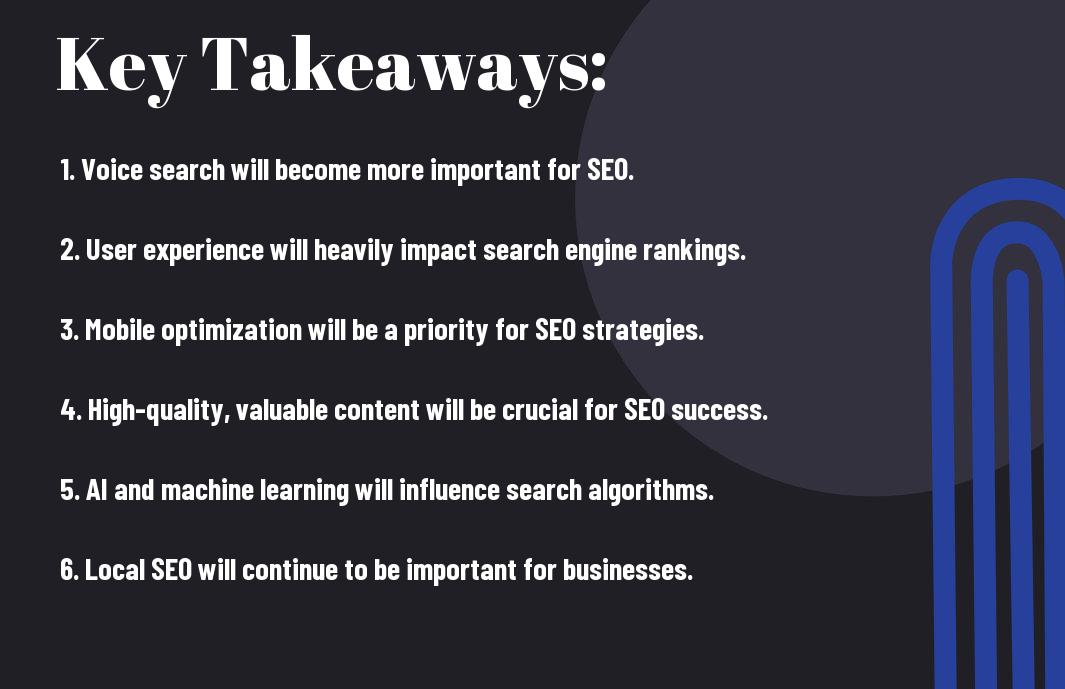When it comes to Search Engine Optimization (SEO), it’s crucial to stay ahead of the curve and anticipate the changes that lie ahead. As technology continues to evolve, so does the landscape of SEO. It’s important for you to be prepared for the challenges and opportunities that the future holds for SEO. In this blog post, we will discuss the key developments and trends that are likely to shape the future of SEO in the coming years. From voice search to artificial intelligence, you will gain valuable insights into what to expect and how to adapt to the ever-changing world of SEO.
Key Takeaways:
- Voice Search: Expect an increasing focus on optimizing for voice search as more users turn to virtual assistants like Siri and Alexa.
- Mobile-first indexing: With Google’s shift to mobile-first indexing, websites will need to ensure their mobile versions are equally as strong as their desktop versions for SEO ranking.
- Machine learning: With advancements in AI and machine learning, search algorithms will become more intuitive and better at understanding user intent.
- User experience: Good UX will become paramount for SEO success, as Google will prioritize websites with high levels of user engagement and satisfaction.
- Content quality: In the coming years, creating high-quality, relevant content that meets user needs will be essential for SEO, as search engines continue to prioritize quality over quantity.

Emerging Technologies Shaping SEO
Obviously, SEO is ever-evolving and as new technologies emerge, it is crucial to stay ahead of the game to ensure your website continues to rank well in search engine results. There are several emerging technologies that are significantly shaping the future of SEO, and it’s important to understand how to adapt to them in order to stay competitive in the digital landscape.
AI and Machine Learning
AI and machine learning are revolutionizing the way search engines, such as Google, rank websites. These technologies are enabling search engines to understand and evaluate content more effectively by deciphering user intent and context behind search queries. As a result, search algorithms are becoming more sophisticated, and your SEO strategy needs to adapt to this.
Voice Search Optimization
With the proliferation of voice-activated devices and virtual assistants, voice search is becoming increasingly popular. Optimizing your website for voice search is crucial for staying relevant in the future of SEO. You need to consider the conversational nature of voice search queries and tailor your content to answer specific questions users may ask verbally. This means incorporating long-tail keywords and natural language into your content to improve your chances of appearing in voice search results.
User Experience and SEO
Keep in mind that as search engines continue to evolve, user experience is becoming an increasingly important factor in your SEO strategy. Search engines are placing a strong emphasis on delivering the best possible experience for their users, and this means that your website needs to be user-friendly, easy to navigate, and provide valuable, relevant content. Factors such as page load time, mobile friendliness, and overall website usability are now playing a major role in search engine rankings. This means that in order to stay on top of your SEO game, you need to prioritize your user experience.
The Role of Mobile-First Indexing
With the increasing use of mobile devices for internet browsing, search engines have shifted to mobile-first indexing. This means that the mobile version of your website will be considered the primary version for indexing and ranking. If your website is not optimized for mobile, you may see a drop in your search engine rankings. Make sure your website is responsive and provides a seamless experience across all devices to ensure that you stay visible in search results.
Site Speed and User Engagement
Your website’s load speed has a significant impact on user engagement and search engine rankings. Slow-loading pages can lead to high bounce rates, which in turn can negatively impact your SEO. Ensure that your website is optimized for speed by minimizing image sizes, leveraging browser caching, and using a content delivery network. By improving site speed, you can create a more positive user experience and boost your search engine rankings.
Content and SEO
Unlike in the past, your approach to content creation and SEO will need to evolve in the coming years. As search algorithms continue to advance, the focus is shifting towards providing high-quality, relevant content that truly adds value to the user’s experience. To stay ahead of the curve, it’s essential to keep an eye on the latest trends and insights in the field of SEO. You can check out this insightful article on The Future of SEO: Predictions and Insights for 2023 and… to gain valuable perspectives on the direction of SEO in the near future.
The Shift Toward Long-form Content
In the ever-changing landscape of SEO, long-form content is becoming increasingly important for establishing your authority and expertise in a particular niche. The depth and detail you provide in your content signal to search engines that you are a valuable resource for users. This also means that your content is more likely to rank higher in search results, providing you with increased visibility and traffic. Embracing long-form content allows you to engage your audience with comprehensive insights and thoroughly address their queries, ultimately leading to enhanced user satisfaction and improved search engine rankings.
Video Content and Visibility
As the demand for multimedia content continues to rise, integrating video into your SEO strategy is essential for staying competitive. Video content provides a dynamic and engaging way to deliver information, captivating your audience and encouraging longer engagement. Search engines are also placing greater emphasis on video content, as it enriches the user experience. By incorporating video content into your website, you can improve your visibility in search results and enhance your overall SEO performance.

Advanced Analytics and SEO
For an in-depth understanding of the future of SEO, advanced analytics will play a crucial role in shaping the landscape. With the increasing complexity of search algorithms and user behavior, traditional SEO strategies are no longer sufficient to achieve the desired results. You need to harness the power of advanced analytics to stay ahead of the curve and remain competitive in the ever-evolving digital ecosystem.
- Advanced analytics tools such as Serpstat provide you with comprehensive insights into keyword performance, backlink analysis, and competitive intelligence.
- You can utilize predictive analytics to anticipate future trends and optimize your SEO strategy accordingly.
- The integration of big data enables you to gain a deeper understanding of user behavior and preferences, allowing you to tailor your content and marketing efforts more effectively.
| Benefits of Advanced Analytics | Implications for SEO |
| Enhanced keyword targeting and optimization | Improved keyword relevance and search visibility |
| Comprehensive competitor analysis | Identification of competitive advantages and opportunities |
Predictive Analytics in SEO Strategy
As you look to the future of SEO, predictive analytics will become an essential component of your strategy. By leveraging predictive analytics, you can anticipate shifts in search behavior, algorithm updates, and market trends. This allows you to proactively adjust your SEO tactics and stay ahead of the competition, ensuring that your website maintains its visibility and relevance in search results.
The Integration of Big Data
With the integration of big data into SEO, you can gain valuable insights into user behavior and preferences. This wealth of information allows you to create more personalized and targeted content, improving user engagement and conversion rates. By leveraging big data, you have the opportunity to optimize your SEO strategy based on real-time insights and trends, ensuring that you are always one step ahead in the ever-evolving digital landscape.
SEO Best Practices
Now, let’s take a look at some of the best practices to follow in order to stay ahead in the ever-evolving world of SEO.
Keeping Up with Algorithm Changes
Staying on top of algorithm changes is crucial to maintaining your website’s search engine rankings. Google’s algorithms are constantly being updated and it’s essential that you stay informed about these changes. Make sure you are subscribed to reliable SEO news sources and keep a close eye on any announcements from major search engines. Adapting to algorithm changes quickly can help you avoid any negative impact on your website’s ranking.
Importance of Ethical SEO
The importance of ethical SEO cannot be understated. While it may be tempting to take shortcuts, using unethical tactics can lead to penalties from search engines and ultimately harm your website’s reputation. Focus on creating high-quality, relevant content that provides value to your audience. Building natural and authoritative links, rather than buying or trading for them, will also benefit your website’s long-term success. Remember that playing by the rules will always pay off in the end.
By staying informed about algorithm changes and practicing ethical SEO, you can ensure that your website remains competitive in the complex landscape of search engine optimization.
To wrap up
As SEO continues to evolve, it’s crucial for you to stay updated on the latest trends and best practices in order to maintain a competitive edge. Keep an eye on the impact of voice search, mobile optimization, and user experience on search engine rankings, and adapt your strategies accordingly. Additionally, continue to invest in valuable content and cultivate strong backlinks to establish authority and credibility in your niche. By embracing these changes and staying ahead of the curve, you’ll position yourself for success in the ever-changing landscape of SEO.
FAQ
Q: What is the future of SEO?
A: The future of SEO will be focused on user experience, quality content, and mobile-first indexing. As search engines evolve, they will continue to prioritize websites that provide valuable, relevant, and easily accessible information to users.
Q: How will voice search impact SEO in the coming years?
A: Voice search is expected to significantly impact SEO by changing the way users search for information. Optimization for long-tail keywords and natural language queries will become crucial, and websites will need to ensure their content is compatible with voice search technology to remain competitive in the search results.
Q: What role will artificial intelligence play in the future of SEO?
A: Artificial intelligence will revolutionize SEO by enabling more personalized search results and improving user experience. AI-powered tools and algorithms will help marketers analyze data, predict trends, and optimize content, allowing for more effective targeting and better understanding of user intent.
Q: How important will mobile optimization be for SEO in the coming years?
A: Mobile optimization will continue to be a top priority for SEO as more users access the internet through mobile devices. Websites that are not mobile-friendly will likely experience lower search rankings and decreased visibility in the search results, impacting overall organic traffic and user engagement.
Q: What changes can be expected in the algorithms used by search engines in the future?
A: In the coming years, search engine algorithms will further prioritize factors such as page speed, secure browsing, and user engagement metrics. Additionally, there may be an increased emphasis on video and visual search, requiring websites to adapt their content and technical optimization strategies to align with these evolving algorithm updates.
